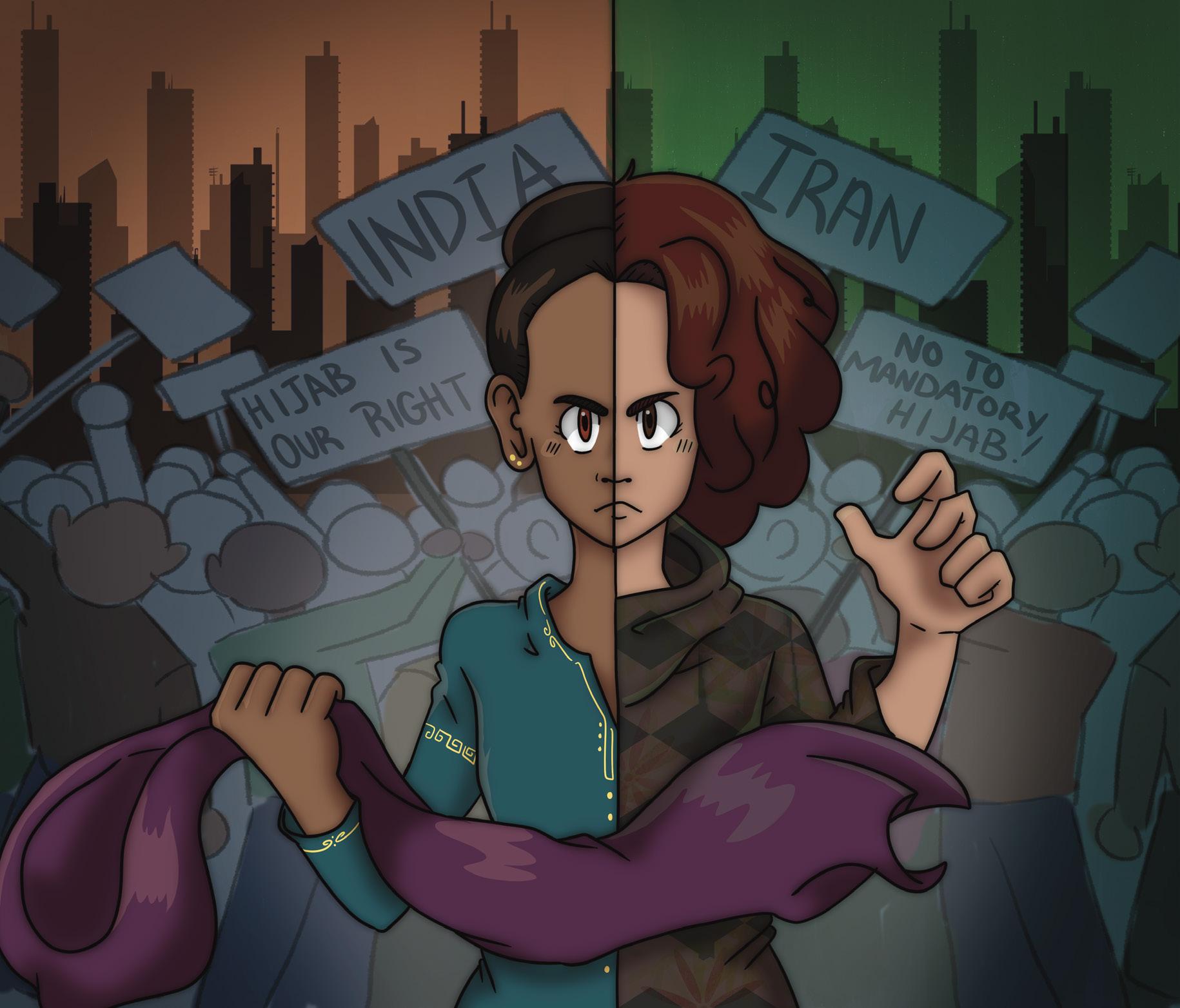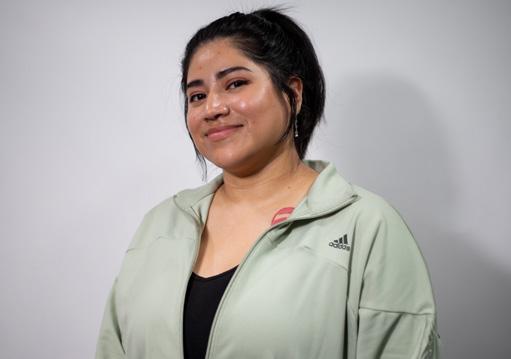
7 minute read
Road to women’s rights proving difficult
Living in the U.S., we can sometimes forget the struggles people in other countries go through to gain basic human rights.
Recently, protests in Iran to end modesty laws have gained traction on social media, particularly on TikTok. The protests began after the death of Mahsa Amani, who was arrested for allegedly breaking the modesty laws around wearing a hijab and taken into custody by the morality police.
Amani’s family, as well as many other people in the country, believe she was tortured and killed by the authorities.
Her death sparked protests all over the country with women demanding the right to dress as they please, going as far as even burning their hijabs in the streets.
Iran’s government has responded brutally to these protests, and many people have been injured and even killed.
While women in Iran are fighting for their right to remove the hijab, the women in India are fighting for their right to keep it.
India’s government has made it very clear that its dislike of Muslims outweighs the care it may have for its own people. The discrimination Muslims face on a day-to-day basis is one thing, but now women and girls are being denied entry to work and school if they choose to wear a hijab.
Similar to the Iranian protests, many Indians — Muslims and nonMuslims alike — were outraged by this, which began another set of protests.
Although these women seem to have opposite causes, their main goal is the same. They each want the right to live their lives and dress the way they want. The U.S. is a country that has the concept of division between church and state, and it’s easy to forget the choices that are in the hands of the people because of it. It is a luxury that not many get to experience. For women in countries like Iran and India, the political influence and twisted religious laws created by their governments have an effect on every aspect of their lives.
Many have questioned what the reasoning behind the government’s interest in the non-issue of how women choose to dress is really about. There are hundreds if not thousands of other issues that should be the focus of government officials, and yet they choose to go after a piece of clothing. Why? Control. The answer always seems to be a need for control over women. a little different, wouldn’t it? “The Jungle,” by Upton Sinclair, was a heavily descriptive book. Heavily describing the working conditions, the sanitation, the meat. If it had been censored right there on the spot, I would get a little nauseous thinking about the whole 180-degree turn history would make for the worst. the household is a necessity for Latinos. We can’t shy away from these issues that affect us.
It’s as if they believe that not allowing a hijab, or on the other end forcing it on, will somehow break the spirit of these women into submission. But the courage of these women and the men who come out to support them just goes to show how wrong that belief system is.
The term “live and let live” cannot be a mantra for these government officials because one side of this issue refuses to give religious freedom by stripping it away completely and the other creates random rules that make no sense and slaps a religious label on them and calls it a day.
At the end of the day, everyone deserves to have bodily autonomy, and that begins with having the right to dress as you please. That goes for both sides of the argument.
Wearing a hijab is a decision that is incredibly personal and cannot be forced or taken from anyone. It’s sad to say that even in the 21st century, women all over the world are still losing their lives over these frivolous debates that have nothing to do with the governments that are sparking them.

The job of a government is to create policies and laws that protect the people of their country while upholding the standards of living they require. Banning a hijab or creating an entire police force to determine if it’s being worn “properly” doesn’t fit into that category.
Another thing we don’t see enough is candidates that look like us, leaving us wondering if these politicians really understand our issues.
HOPE SMITH campus editor hope.smith393@my.tccd.edu
Where do we go as a society once we’ve censored all that we can out of literature, out of books?
The term being used is “challenged,” but really the books are being censored.
Those who challenge these books would argue that it’s not so wrong. Books with sexually explicit content, books with profanity, books upon books of violence. Why shouldn’t they, when it’s right there?
So they challenge them. They challenge “The Bluest Eye” because it is sexually explicit, because it views racial oppression. “Lawn Boy’’ must be as well. It also deals in the sexual explicity of the LGBTQ variety. Oh, challenge “The Hunger Games” to drive it all home, too.
Death row is so close for literature that focuses on topics deeper than what some of us are going to deem acceptable. It is impossible to please us all because we are all afraid.
These challenged books provide so much more than their tagged red flags. The point of these stories is to make people aware. An educated country relies on awareness.
Imagine where America would be without it.
VIEWPOINTS The Collegian is a weekly student publication serving the Tarrant County College District. Editorial statements and advertisements do not necessarily reflect the opinion of the TCC administration. Letters to the paper should be 150 words or less, free from libel and poor taste and include the writer’s Colleague ID or telephone number (the numbers will not be published). Letters may be brought to The Collegian of-
But they are willing to challenge books on race inequality, on queer identity, on whistling women wielding bows and arrows? Yes, it appears.
Disillusionment with the government we have in place is also a factor. Politicians can seem sketchy and their motives are never clear.
When these censors who are playing God are done on the seventh day, will they rest?
This isn’t even an old story. In a Ray Bradbury, “Fahrenheit 451”-esque way, we are inching so much closer to Guy Montag’s world. In my sophomore year of high school, I remember reading that book. I remember thinking about how extreme circumstances would need to be where things would be in Fahrenheit’s world, where books were completely, entirely banned. I also remember my teacher telling the class that exact book was banned in a school or two.
Ray Bradbury, if not rolling in his grave, was at the very least back flipping.
So I ask again where we go as a society.
Because where I see it, we are too scared to really see the necessity, the definite need for books that look at the hidden, oppressed, the shameful parts and the brashness of humanity. Under a country that follows an amendment as number one, the amendment that allows for us to reach out and give serious messages, we move a step forward each time.
Latinos are the largest minority voting group, but you won’t see that reflected at the polls.
As a first generation Mexican-American this bothers me. Texas has a very large Latino population but our vote is lagging. Not becoming engaged in politics means we are letting other people make decisions for our communities.
Low voter turnout from the Latino population leads to policy being created that does not serve us.
There are unique barriers we need to overcome to improve turnout at the polls. Until then, we will remain under served by these politicians.
For first-time voters the process can seem confusing and scary. Understanding what leads us to disengagement is perhaps the first step.
Becoming a citizen is a lengthy process, leaving a lot of Latinos without the ability to vote. This was the reality for a lot of our parents or grandparents.
This causes Latino children to grow up in a household where voting doesn’t exist. Without an example of that civic engagement, it can be difficult to know where to start.
We already feel so neglected by the system. This has caused serious trust issues. It can make voting seem like a hopeless act.
Latinos are purposefully alienated by the system. It is hard to take up space in places that have not been historically welcome to Latinos.
Mexican immigrants have been singled out specifically by a certain former president and this has affected Latino views on engaging in politics.
I still shudder when I hear someone talk about building a wall. Or when I see immigrants being shuttled around and used as political pawns.
For those of us who have undocumented family members we should be aware of any laws being passed that might affect them. Immigration is a hot topic all over the world, but these issues can hit home for Latinos.

There is definitely not always a solution for every problem affecting our community. That being said, by voting we can do our best to take care of our families.
We don’t have to accept things the way they are. There is so much power in democracy. Take ownership of the Latino vote. Every vote is a win.
The meat packing industry would look
Having more political conversations in fice (NCAB 1124A, NE Campus),or mailed to: The Collegian 828 Harwood Road Hurst, TX 76054 Office: 817-515-6391 email: collegian.editor@tccd.edu
IRENE DOMINGUEZ campus editor irene.dominguez370@my.tccd.edu In the Sept. 28 issue, the opening date of the SE Campus production “A Piece of My Heart” was incorrectly identified. It opens on Oct. 5. Also the campus on the headline for Faculty Biennial feature was incorrectly identified. It is SE Campus.
The window to get registered is closing and I want us all to make it. Let’s pretend it’s a Bad Bunny concert and swarm the polls!
TCC is an equal opportunity institution that provides educational and employment opportunities on the basis of merit and without discrimination because of race, color, religion, sex, age, national origin, veteran status or disability.




